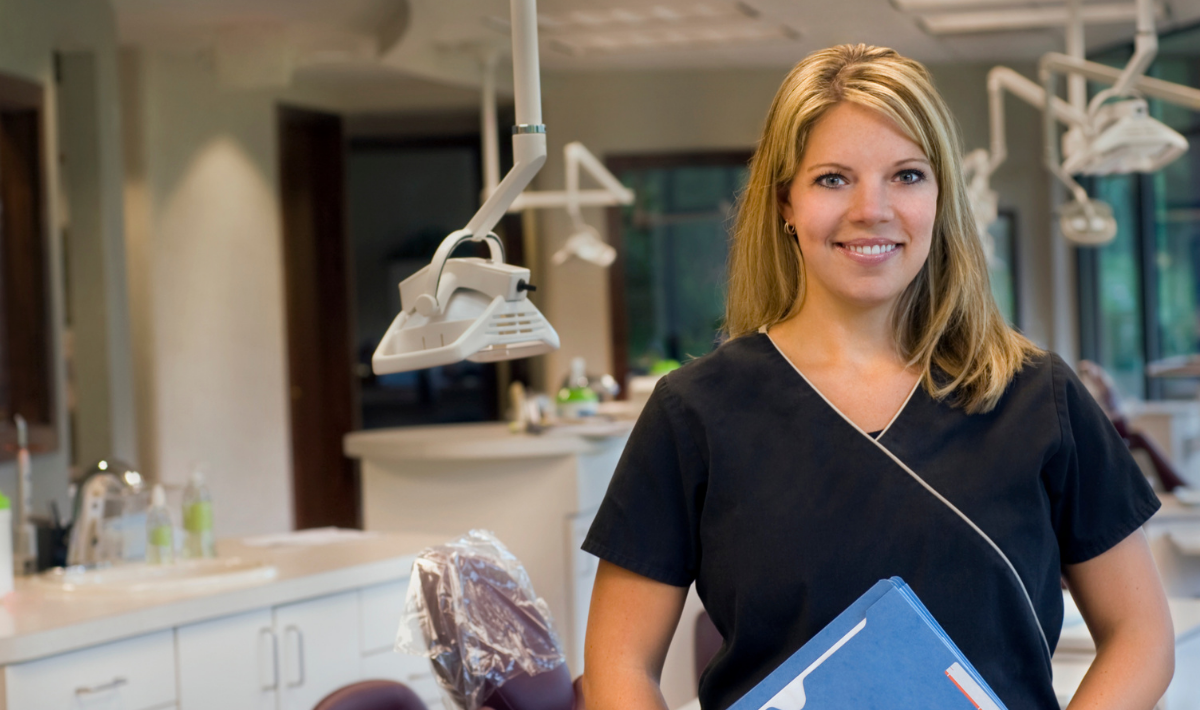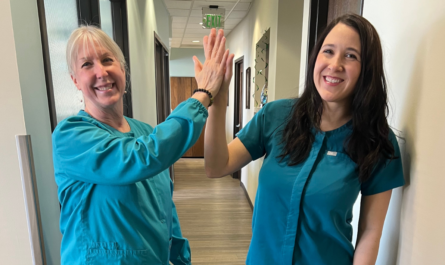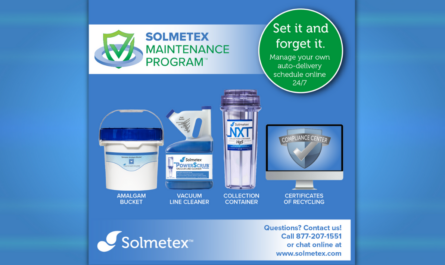As dental hygienists assume a growing role in preventive oral healthcare, they help ensure patients get the care they need.
By Laura Thill
Clean teeth are important. But, today dental hygiene means much more than it once did. Indeed, if anyone is key to the patient experience, it’s the dental hygienist. They have come to play an expanding role in periodontal care, often spending more time with patients than their colleagues – including the dentists. As their responsibilities continue to grow, it’s more important than ever for them to stay educated on new technology and services that enable them to promote excellent preventive care.
“The role of hygienists is evolving across the entire industry – not just in DSO-supported practices,” says Maureen Howes, RDH, MS, managing director of hygiene services, Aspen Dental Management Inc. “In addition to being preventive specialists, hygienists have become highly skilled periodontal therapists. In the past, a dentist would often refer cases of patients with early periodontal disease to a periodontist. However, with the introduction of many new therapies and antibiotics for its treatment, hygienists now have a bigger role as technical experts in this type of care. This is important because it allows patients to receive non-surgical treatment in a practice where they are comfortable, and from a familiar, trusted health professional.
“Hygienists play a critical role in monitoring the overall health of their patients,” Howes continues. “They look for connections between oral health signs and symptoms and systemic body issues. Hygienists must keep up with technology, including both industry innovations and patient homecare technologies. They must continually educate themselves on advancements in everything from paperless periodontal charting, digital imaging and whitening systems, to probiotics, local anesthesia methodologies and lasers.”
Treat the disease
“Historically, our role has been to clean teeth,” says Holly Caccia, RDH, hygiene director-Georgia, Great Expressions Dental Center. “The focus was on the teeth and not on the patient’s total-body health. These days, the hygienist works alongside the doctor, as a team, in providing patient care.” Today, they have even more responsibility, including a bigger role in helping educate the patient and aiding in the recognition of periodontal disease, she points out. “According to the American Dental Association and Centers for Disease Control and Prevention, over 50 percent of Americans over 30 years of age have some form of periodontal disease. If we do not treat it, it can lead to larger dental and even health problems down the road.”
That said, dental professionals – including hygienists – are taking a more comprehensive view of dental care, and DSOs such as Great Expressions Dental Centers provide a range of services. “This is the nice part of Great Expressions Dental Centers,” says Caccia. “Our philosophy is to prevent and treat the disease. We do it all, from preventive care to orthodontics, surgery and cosmetic dentistry.”
That means hygienists must keep abreast of new oral care products and treatments, she says. “Hygienists need to know about things like Invisalign, and how it can help patients in terms of health (correct bite), self esteem, and more. There are always new oral care products, such as whiteners. These products can impact people’s lives, from both a health and beauty standpoint.”
The philosophy should always be to do what’s best for the patient, Caccia continues. “Sometimes that means engaging patients in potentially uncomfortable discussions about the extent of the disease and infection and the treatment needed to restore the patient to health. At Great Expressions Dental Centers we promote to the patient that we have multiple financing and payment options, so the fear of losing a patient over finances is a non-issue. We participate with all major insurers, so our care is affordable.”
The patient experience
“The new patient clinical experience begins in the hygiene chair,” says Lisa Kallis, director of hygiene, Heartland Dental. “Hygienists have always been providers and the heart of the practice.” In fact, Heartland Dental-supported offices are doctor-led but hygiene-driven, she adds.
“We continue to see the hygiene provider elevate to a higher-level advocate for patient care – both restorative and preventative – not just infection control (periodontal disease treatment and cavity control),” Kallis continues. “One of the areas of higher responsibility hygienists have is that of educating [patients about] what we know today – that is, that the conditions that exist in the oral cavity can also be affecting entire body health, and vice versa. It is very important to stay updated on the influx of research that shows this correlation. Prevention is a big area that we need to be accountable for with the increase of medications causing dry mouth and high sugar diets. Patients are more susceptible to decay than ever before, and educating about brushing, flossing and fluoride is not enough any longer. Sensitivity is more common now and we now have more ways that the hygienist can educate and help treat this. With oral cancer on the rise, it has also become a concern of hygienists for their patients to have enhanced screenings.”
A heavy load
More responsibility for hygienists can mean longer hours and new issues to address within their practice. And, they are definitely up to the task, note experts.
“As a rule, hygienists are continuing education junkies,” says Howes. “They are very motivated to take on new responsibilities to better themselves personally and to expand the knowledge base of the profession.
“From my experience with the hygienists that we at ADMI support, they love the opportunity to help patients with high dental need,” Howes continues. “In fact, we’ve been conducting some analysis that shows that the average new Aspen Dental patient hasn’t been to the dentist in more than three years, and one in four patients hasn’t visited in more than five years. We know that they have had barriers to care, and so it’s important to educate with compassion to help motivate them to stick with their treatment. Hygienists at Aspen Dental welcome this responsibility. They love the reward of watching complex dental patients achieve oral health. It’s really a core part of our culture. [In fact], two of the key values at Aspen Dental-branded practices are We love a challenging mouth and Every mouth deserves a second chance.
“Today there is a greater recognition of the role the hygienist plays in the dental care of the patient and dental team in the office,” says Caccia. “In DSOs, this is how we are structured. Great Expressions Dental Centers is built on a team environment, as that is what is best for the patient. The hygienists are an integral part of the team and are trusted based on their clinical excellence.”
Training is key
As they play a greater role in patients’ dental treatment care, it is essential for hygienists to attend continuing education classes to keep up with new treatments, processes and standards, according to Caccia. For DSOs such as Great Expressions, it has become increasingly important to ensure that all hygienists across the organization follow consistent preventive care protocols. “This is over-the-top important,” she says. “Hygienists need to follow the guidelines and protocols based on research and dental associations, like the American Dental Association, the American Academy of Periodontology, the American Association of Orthodontists, and more. These are standards of care, and standards of care do not change between offices. At Great Expressions Dental Centers, we have our National Doctor Panel, which consists of our chief clinical officer and clinical partners from each region to set our clinical protocol, reviews of research, topics in the industry and dental associations.
“At Great Expressions Dental Centers, the standards come from the National Doctor Panel and regional hygiene directors,” Caccia continues. “Regional hygiene directors work with each team in their region. We have an onboarding process once the candidate is selected, which involves a lot of training. From there, I am constantly auditing charts and listening to how our hygienists are presenting treatments to patients. I want to make sure we are making patients as comfortable as possible and that they understand the hygienists and get the care they need.
“Additionally, quarterly meetings are mandatory for our hygienist to keep them abreast of any changes and address any challenges they may face,” says Caccia. “We also offer online training for things like oral care products or our dental software. As of January 1st, our employees have the capability of free online CE courses through our GEDC Viva Learning System.”
Heartland Dental relies on benchmarking studies to ensure its hygienists demonstrate a consistent standard of excellence in patient care, according to Kallis. “Heartland Dental continually offers training on benchmarking – a standard or point of reference against which things may be compared or assessed,” she says. “Using this training, patient care data from all supported offices can be collected and analyzed to see if it falls into an established standard. Through studying a large number of dental offices and identifying similarities and differences, this standard can be set. This process is extremely beneficial in helping supported [offices] learn what they are doing well from a care standpoint, and what opportunities they could take advantage of to ensure their patients are receiving the care they need, desire and deserve.”
Although Aspen Dental does not set clinical policies or establish organization-wide protocols for its hygienists, it does expect each practice to “establish and maintain a high standard of care for his or her practice and employees,” says Howes. “This means they hold hygienists and other team members accountable and highlight best practices. More importantly, every hygienist must adhere to the American Dental Hygienists Association (ADHA) standards of care.
“At Aspen Dental Management Inc., our role is to offer ongoing development opportunities, including continuing education, peer review and mentor programs that support Aspen clinicians,” Howes continues. “Of course, it’s challenging to deliver great development opportunities to the hygienists we support because of geography; there are nearly 500 practices in 30 states. That’s why our team at ADMI leverages technology, distance learning, mobile applications, discussion boards and other features to make it easier for clinicians to share case studies and best practices with one another.”
Continued growth ahead
As dental health continues to evolve, so will the role of hygienists, note experts. And, DSOs plan to encourage and support them as they do so. “Dentistry will continue to change with enhancements in diagnostic technology, enhanced supplies and research,” says Kallis. “Education will continually be updated to support these focuses to ensure team members have access to them.”
“The role of the dental hygienist will continue to evolve industry-wide, beyond that of a preventive specialist to a highly skilled periodontal therapist, motivator, holistic health educator and business person who manages [his or her] hygiene department,” says Howes. “Aspen Dental practices, in particular, have a unique focus on a patient base that has traditionally been underserved. Sadly, on the list of priorities, dental care sometimes doesn’t make the cut. Dentistry has become discretionary – a nice to-do rather than a must-do. People are anxious and scared. They’re in pain, whether physical or emotional. And most of all, they’re worried about cost.
“Patients deserve both choice and access when it comes to selecting a dental care provider,” Howes continues. “That’s why the dentists, hygienists and staff at Aspen Dental practices focus on removing barriers to care. They believe that everyone has the right to quality, affordable oral health care close to home. That means helping those patients with complex medical histories, financial barriers and extensive dental needs get the care they deserve – often through the help of a qualified dental hygienist.”
“Great Expressions hires hygienists who are willing to go that extra mile and have an open mind when it comes to learning new things,” says Caccia. “We want hygienists who have a warm and caring demeanor and can build trust with a patient, yet are aggressive enough to be a leader. No one cares how much you know until they know how much you care!”





